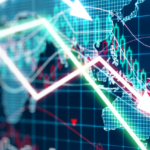
View Our November 2019 Market Review
November 22, 2019
March 2020 Capital Markets Update
March 27, 2020Clearly the world is closely following the trajectory of the coronavirus outbreak. Uncertainty is global and as citizens we are unsettled, which is manifesting itself in the investment markets.
Fundamentally, markets dislike uncertainty, processing information in real-time whether positive or negative, leading to increased volatility. When markets move rapidly downward, our experience shows us that the associated stress tends to be greater than the positive feelings one generally experiences during a rising market. Our client portfolios are designed to moderate the risk associated with current events, provide liquidity and position you to be opportunistic.
Market declines can occur when investors are forced to reassess expectations for the future. The outbreak’s expansion is causing worry amongst governments, corporations and individuals about the near and longer term impact on the global economy. Apple announced earlier this month that it expected revenue to take a hit from problems making and selling products in China1. Australia’s prime minister has said the virus will likely become a global pandemic2, and other officials there warned of a serious blow to the country’s economy3. Airlines are preparing for the toll it will take on travel4. These are just a few examples of how the impact of the coronavirus is being assessed.
The market is responding to new information in real time and is attempting to price in unknown factors. As risk increases during a time of heightened uncertainty, so do the returns investors demand for bearing that risk, which initially pushes prices lower. When approaching the market from a long-term, unemotional, and disciplined perspective this relationship between risk and reward is core to our investment philosophy. This helps us to make prudent investment decisions for our clients no matter the circumstances.
We can’t state with confidence when this crisis will moderate and hopefully end. However, our expectation is that those bearing today’s risk will be compensated with positive expected returns. We need only reference lessons learned from past health crises, such as the Ebola and swine-flu outbreaks earlier this century, and of market disruptions, such as the global financial crisis of 2008–2009. Further, history has shown no reliable way to identify a market peak or bottom, supporting our belief against making market moves based on fear or speculation, even as difficult and traumatic events transpire.
Amid the anxiety that accompanies developments surrounding the coronavirus, decades of financial science and long-term investing principles remain a strong guide. If you have specific portfolio questions, liquidity or changing financial needs please call us to discuss.
From your 5C Advisory Team.




